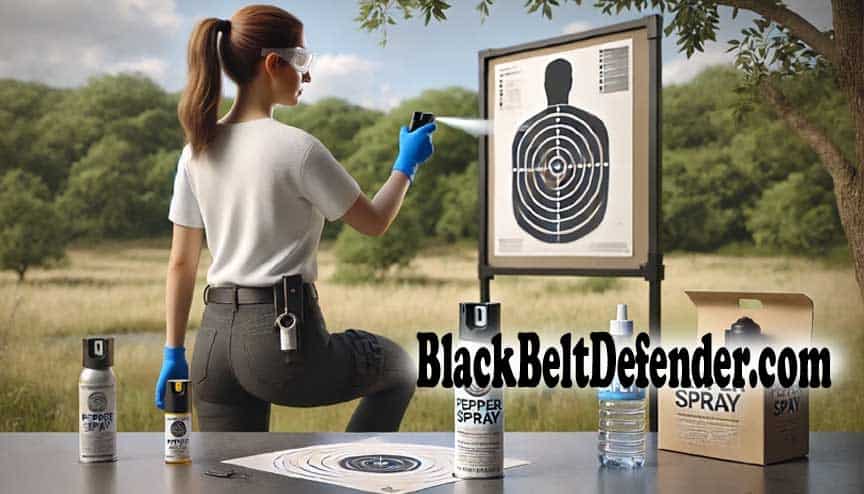
Pepper spray is a powerful self-defense tool, but ensuring it works effectively when you need it most requires proper testing and maintenance. This guide will walk you through everything you need to know about testing your pepper spray, from preparation to legal considerations, empowering you to use it confidently and responsibly.
Why Test Your Pepper Spray?
Testing your pepper spray serves multiple purposes:
- Ensures Functionality: Regular tests confirm that your spray operates correctly, including the nozzle, pressure, and spray pattern.
- Builds Familiarity: Practicing with your spray enhances your confidence and reduces hesitation in emergencies.
- Maintains Effectiveness: Pepper spray can degrade over time, so periodic checks ensure it remains potent and reliable.
How to Test Pepper Spray: Step-by-Step Guide
1. Choose a Safe Testing Location
Always test your pepper spray in a well-ventilated, outdoor area away from people, pets, and flammable materials. Avoid windy conditions to minimize accidental exposure.
2. Inspect the Canister
Before testing:
- Check for Damage: Look for cracks, leaks, or other signs of wear on the canister.
- Verify the Expiration Date: Expired pepper spray may lose potency or fail to function altogether.
- Examine the Nozzle: Ensure it’s clean and unobstructed.
3. Use Practice Sprays if Available
Many pepper spray manufacturers offer inert practice sprays. These sprays allow you to familiarize yourself with the device’s mechanics, range, and spray pattern without exposing yourself to the active ingredient.
4. Conduct the Test
- Hold the canister firmly, ensuring the nozzle faces away from you.
- Activate the safety mechanism as instructed by the manufacturer.
- Press the trigger briefly, releasing a short burst toward a disposable target, such as a cardboard sheet.
- Observe the spray pattern and range, ensuring they align with the manufacturer’s specifications.
5. Evaluate the Results
- Consistent Spray Pattern: The spray should produce a steady stream or mist, depending on the design.
- Adequate Range: Measure the distance to ensure it matches the advertised range.
- No Malfunctions: Check for leaks, sputtering, or inconsistent output.
Safety Precautions During Testing
- Wear Protective Gear: Use gloves and goggles to prevent accidental exposure.
- Avoid Indoor Testing: Testing indoors can cause irritants to linger, posing risks to others.
- Dispose of Test Materials Safely: Discard used targets and cleaning materials in sealed bags.
Understanding Pepper Spray Ingredients
Pepper spray’s effectiveness comes from oleoresin capsicum (OC), a natural extract from chili peppers. Here’s what you need to know:
- Capsaicin Levels: The potency of the spray is measured in Scoville Heat Units (SHU). Higher SHU indicates greater strength but also a higher risk of overexposure.
- Expiration and Degradation: Over time, the active ingredients may lose their efficacy. Always check the expiration date and store the canister in a cool, dry place.
Common Issues and Troubleshooting
1. Inconsistent Spray Output
- Cause: Blocked nozzle or low pressure.
- Solution: Clean the nozzle with a soft cloth and test the canister again. Recharge or replace the spray if necessary.
2. Reduced Potency
- Cause: Expired spray or improper storage.
- Solution: Replace the canister with a new one and store it according to the manufacturer’s guidelines.
3. Malfunctioning Trigger
- Cause: Mechanical defects or debris.
- Solution: Inspect and clean the trigger. If the issue persists, contact the manufacturer for a replacement.
Cleaning and Disposal After Testing
After testing:
- Clean Residues: Wash any exposed surfaces with mild soap and water.
- Proper Disposal: Dispose of used materials in sealed bags to prevent accidental exposure.
- Sanitize the Canister: Wipe the exterior of the canister to remove any lingering residue.
Legal Considerations for Testing
Before testing your pepper spray, familiarize yourself with local laws:
- Usage Restrictions: Some areas may restrict where and how pepper spray can be discharged, even for testing.
- Legal Age Requirements: Most jurisdictions require users to be 18 or older.
- Prohibited Locations: Avoid testing near schools, government buildings, or public spaces where pepper spray use may be restricted.
Enhancing Your Knowledge and Preparedness
1. Practice Regularly
Use inert sprays to practice aiming, triggering, and controlling the device. Familiarity reduces panic in real-life situations.
2. Combine with Other Self-Defense Tools
While pepper spray is effective, consider complementing it with additional tools like stun guns, personal alarms, or tactical pens for a comprehensive safety strategy.
3. Take a Self-Defense Class
Understanding how to use pepper spray effectively in real-world scenarios can significantly boost your confidence and preparedness.
Frequently Asked Questions
Can You Test Pepper Spray Without Using It?
Yes, you can inspect the canister and use inert sprays to simulate testing without deploying the active ingredient.
How Often Should You Test Pepper Spray?
Test your pepper spray every 3–6 months to ensure functionality and familiarize yourself with its use.
Is It Safe to Test Pepper Spray Indoors?
No, testing indoors can lead to accidental exposure and lingering irritants. Always test in a well-ventilated outdoor area.
What Should You Do if Pepper Spray is Expired?
Dispose of it safely according to local regulations and replace it with a new canister to ensure reliability.
Conclusion: Be Prepared, Stay Safe
Testing your pepper spray is an essential step in ensuring your safety. By understanding its mechanics, testing it regularly, and following safety precautions, you can rely on your pepper spray when it matters most. Combine this knowledge with ongoing self-defense training and other tools to create a robust personal safety plan.
Remember, preparation is the key to confidence. Don’t wait until you’re in a dangerous situation—test, learn, and be ready to protect yourself effectively.
As always, be safe and be prepared.
See Also:





